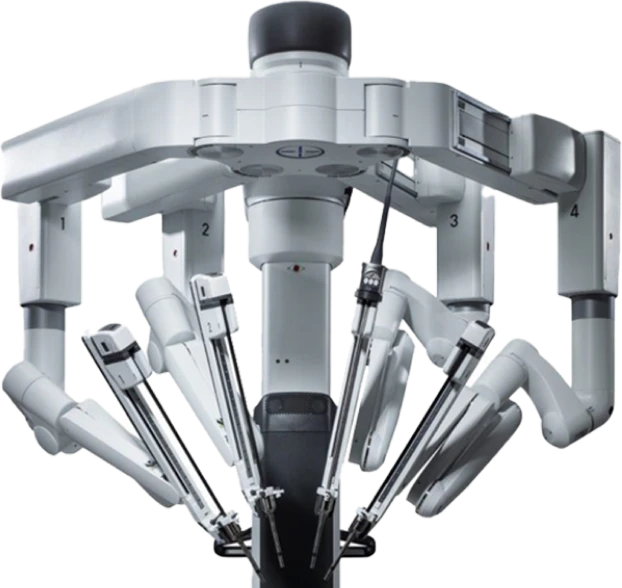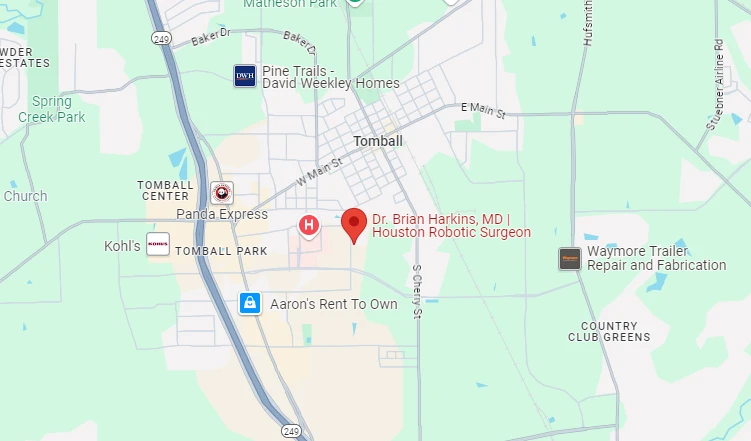Using the latest DaVinci surgical system, Dr. Brian Harkins specializes in minimally invasive hernia repair, providing faster recovery and trusted results tailored to your needs.




Hernias occur when internal tissues or organs push through the muscle wall. Hernias are defects within the groin or abdominal areas that cause the abdomen’s contents to bulge through. The most common type of hernia is an abdominal hernia where fatty tissue protrudes through a hole in the stomach wall, causing a lump under the skin. Hernias are commonly situated at the groin and umbilicus because these areas feature congenital weakness. Hernias may also form at the site of an incision from a previous surgery.
The different types of hernia include inguinal, ventral, hiatal, umbilical, and incisional. A hernia does not heal by itself as it needs surgery for the repair– an operation consisting of a mesh reinforcement, to strengthen the abdominal wall.
Dr. Brian Harkins provides you with an individualized plan to manage and treat your hernia.
Hernias occur when an organ or tissue pushes through a weak spot in the surrounding muscle or connective tissue. While some hernias may cause minimal discomfort, others can lead to significant pain and complications if left untreated. Depending on the type and severity, surgical intervention may be necessary to prevent further complications such as obstruction or strangulation of the intestines. Below, we explore the most common types of hernias, their causes, and the available treatment options.

An umbilical hernia occurs when part of your intestine bulges through the opening in your abdominal muscles near your belly button (navel). Umbilical hernias are common and typically harmless. They are most common in infants, but they can also affect adults. If this type of hernia is left untreated, the size of the protruding intestine might get bigger and become strangulated leading to the reduction of blood flow to surrounding tissues.

An inguinal hernia is sometimes called a groin hernia (“inguinal” means “in the groin”). It’s the most common type. Inguinal hernias usually affect people who are assigned male at birth. Approximately 75% of all hernias are inguinal. An inguinal hernia occurs when tissue, such as part of the intestine, protrudes through a weak spot in the abdominal muscles in the groin region. Inguinal hernias occur because of a weakening of the muscles in the area between the lower part of your abdomen and your thigh. The resulting bulge can be painful, especially when you cough, bend over, or lift a heavy object. Hernias aren’t always serious, but serious complications can develop. Hernias do tend to worsen over time. As the opening becomes weaker and wider, more tissue can push through it. Not all inguinal hernias have symptoms. Sometimes, symptoms come and go. A hernia may slide in and out of the opening, or you may only feel it during certain activities. The more tissue pushes through, the more likely it is to become trapped.

Ventral hernias occur anywhere on the abdomen and include umbilical (belly button) hernias, epigastric (upper abdominal) hernias, supra-pubic (above the pubic bone) hernias, and incisional hernias, which develop at a previous surgical incision site. The most common symptoms include bulging or pain in these areas.
Causes of ventral and incisional hernias include:

A hiatal hernia occurs when the upper part of your stomach bulges through the large muscle separating your abdomen and chest (diaphragm). Hiatal hernias can be caused by injury, trauma, or certain types of surgery. Other causes can include being born with an unusually large hiatus, persistent and intense pressure on the surrounding muscles while coughing, vomiting or straining during a bowel movement, exercising or lifting heavy objects.
Simple hernia protrusions can be reduced and manually pushed back in an outpatient facility. But an urgent assessment is necessary when a hernia causes sudden pain and the protruding tissue cannot be pushed back in. This is usually a sign that the tissue is trapped and tightly pinched in the hole. This is called obstruction and can lead to cutting off of blood supply to these tissues, which is a very dangerous condition. A hernia causes pain and can lead to more complicated strangulation of the intestines. Hernia surgery is done to push back the protruding tissue and repair the hole with the weak area reinforced with mesh.
Dr. Brian Harkins specializes in diagnosing and treating all types of hernias with advanced techniques and personalized care. If you're experiencing hernia symptoms or have concerns, consult Dr. Harkins to explore effective solutions and take the first step toward improved health and comfort.


Dr. Brian Harkins is a renowned surgeon specializing in advanced, minimally invasive, and robotic surgical techniques. With a dedication to innovation and personalized patient care, he has transformed countless lives by delivering exceptional outcomes.

I want a website like this, where do i start?